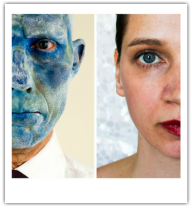interdisciplinaryness, documented
interdisciplinaryness: a course in provoking creativity

“It takes two to know one.” -- Gregory Bateson
By working in pairs and giving one another assignments, students will engage in a series of collaborations throughout the course. Within this microcosm they will experience multiple scenarios of artistic content, form, intention, outcome, critique, and communication as they generate individual and collective bodies of work.
Additionally, students will thoughtfully and deeply interrogate their own artistic processes, as well as the impact/experience of their various collaborators, through the lens of a prescribed protocol for reflection and dialogue. With cross-disciplinary encounter as a core principle, this course questions traditional divisions of discipline, encourages the possibility of discovery in working in unfamiliar territory, and promotes the blurring of lines and assumption of multiple roles.
This course is intended for artist-students who:
· Have a strong and/or abiding interest in collaboration.
· Get excited by dialogic process.
· Want to be surprised by their own work and the work of others.
· Teach or intend to teach and would like to deepen their experience of the art assignment as a pedagogical form by giving, getting, and reflecting on a series of customized directives.
· Are undertaking or expect to undertake disciplines that shape artistic work through human encounter, such as devised or scripted theater, collaborative choreography, commissioning, curation, comprehensive critique, art direction and editorial work.
KEY QUESTIONS
What is collaboration?
What is creativity?
How do we define discipline and distinguish between discipline?
What does it mean to have interdisciplinary inclinations?
Can you further your work through the work of another?
Are originality and creativity synonymous? Is originality the pinnacle of creativity?
How do we work in partnership?
How can we shape divergent and convergent thinking?
When are we being generative, editorial or both?
How can we have more fun, learn more stuff, and make new stuff that excites us?
This course can be tailored to work within a variety of structures. Please contact me for more details.
By working in pairs and giving one another assignments, students will engage in a series of collaborations throughout the course. Within this microcosm they will experience multiple scenarios of artistic content, form, intention, outcome, critique, and communication as they generate individual and collective bodies of work.
Additionally, students will thoughtfully and deeply interrogate their own artistic processes, as well as the impact/experience of their various collaborators, through the lens of a prescribed protocol for reflection and dialogue. With cross-disciplinary encounter as a core principle, this course questions traditional divisions of discipline, encourages the possibility of discovery in working in unfamiliar territory, and promotes the blurring of lines and assumption of multiple roles.
This course is intended for artist-students who:
· Have a strong and/or abiding interest in collaboration.
· Get excited by dialogic process.
· Want to be surprised by their own work and the work of others.
· Teach or intend to teach and would like to deepen their experience of the art assignment as a pedagogical form by giving, getting, and reflecting on a series of customized directives.
· Are undertaking or expect to undertake disciplines that shape artistic work through human encounter, such as devised or scripted theater, collaborative choreography, commissioning, curation, comprehensive critique, art direction and editorial work.
KEY QUESTIONS
What is collaboration?
What is creativity?
How do we define discipline and distinguish between discipline?
What does it mean to have interdisciplinary inclinations?
Can you further your work through the work of another?
Are originality and creativity synonymous? Is originality the pinnacle of creativity?
How do we work in partnership?
How can we shape divergent and convergent thinking?
When are we being generative, editorial or both?
How can we have more fun, learn more stuff, and make new stuff that excites us?
This course can be tailored to work within a variety of structures. Please contact me for more details.
